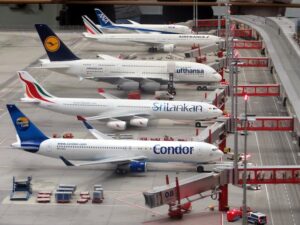 Transportation in Latin America has a very important deficit in infrastructure that has hindered its economic and social development since the 20th century, both in terms of land, sea and air transportation. To this weakness, if we add the great distances that exist in the region and the orographic difficulties derived from the mountains, jungles, rivers, etc., the most efficient and safe form of transportation is found in aviation.
Transportation in Latin America has a very important deficit in infrastructure that has hindered its economic and social development since the 20th century, both in terms of land, sea and air transportation. To this weakness, if we add the great distances that exist in the region and the orographic difficulties derived from the mountains, jungles, rivers, etc., the most efficient and safe form of transportation is found in aviation.
Because we say that the industry air is important for economic-social development.
Economic Development
Directly, the airline sector is a great generator of regional wealth. It is an important creator of direct, indirect and induced employment (airlines, airports, related administrations, ground services, catering, hotels, restaurants, etc.). It is one of the main means of entry of foreign currency into the country, whether by tourism or by export, since although in volume this industry has a small relative weight compared to the naval or land industry, it does have a very relevant importance in terms of the value of what is transported. It is the transportation channel that facilitates and promotes the conduct of business, where foreign investment is developed and which generates a direct relationship between economic development and a country’s international connections.
Social Development
Air transport should not only be seen as a tool for economic development. In Latin America, it is also the most relevant tool for social development.
As we had indicated, derived from the deficit in land transportation infrastructure and the geographical nature of Latin America (great distances and orographic difficulties), air transportation has become a vital factor in facilitating the mobility of people from poor areas to the rich to prosper economically and socially and later return to their places of origin to visit their loved ones. It is the fastest channel to bring social resources (health, education, etc.) to the most  disadvantaged sectors of the population from the most developed areas of the region. In addition, aviation has been fundamental in mitigating the effects of natural disasters and providing a rapid response to the needs of these areas affected by earthquakes, floods, etc. Therefore, air transport promotes equal opportunities, the correct distribution of social goods and the cohesion of the region’s territories.
disadvantaged sectors of the population from the most developed areas of the region. In addition, aviation has been fundamental in mitigating the effects of natural disasters and providing a rapid response to the needs of these areas affected by earthquakes, floods, etc. Therefore, air transport promotes equal opportunities, the correct distribution of social goods and the cohesion of the region’s territories.
Variables Of Sustainable Development
Once it is clear that the aviation industry is very relevant for economic-social development, it is important to identify the variables necessary to make its growth sustainable and thus contribute to the region’s development in the long term. These variables are Regulation (tax, labour, operational, etc.) that is clear and that, without undermining the rights of passengers and members of the industry, is flexible and adapts to the volatility and speed of change in the industry; Infrastructures efficient and effective that make air transport grow and reduce its costs to favor lower fares and thus be able to reach more future passengers; Commitment of the governments of the region to support the industry as a whole, given that this support and this alignment in infrastructure, regulatory, tourism policies, etc. will benefit all the inhabitants of the region.
IATA and ALTA are playing an important role in spreading the importance of the industry and, therefore, aligning all its participants to achieve the economic-social objectives in the region as quickly and efficiently as possible. Therefore, it will be one of the focuses of the 10th edition of the Wings of Change 2018 conference, on April 4 and 5 in Santiago, Chile, where the main authorities and executives of the airline industry meet every two years.
